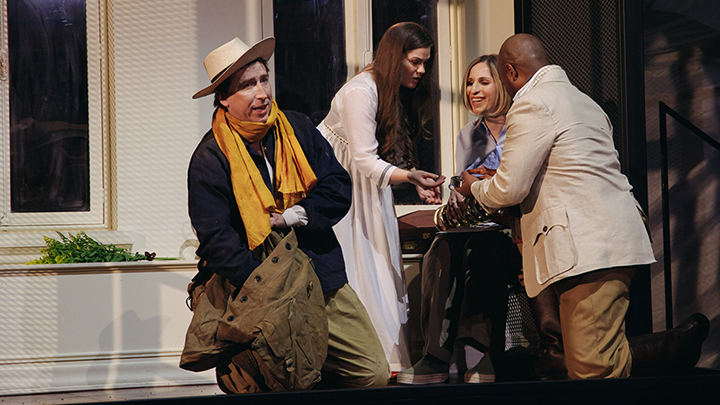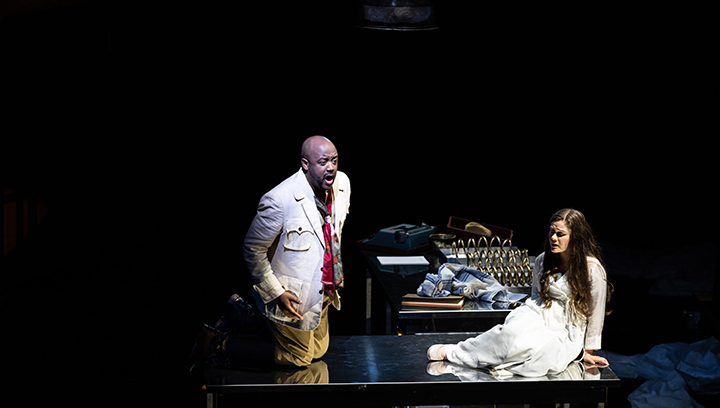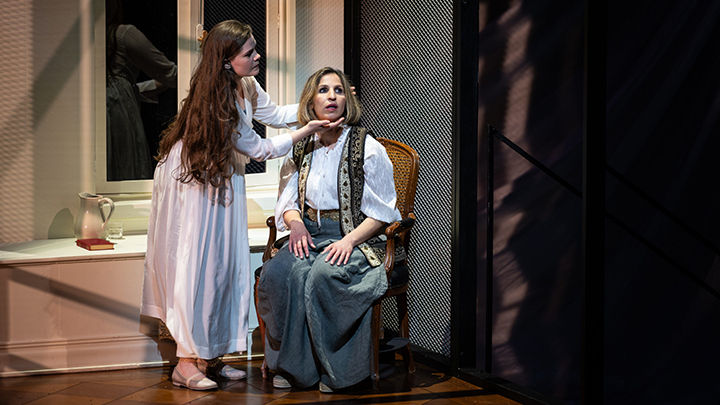In the opera, wickedly goaded along by the hallucinatory Aegean sun, a sordid quartet of characters gradually hacks away at the layers of propriety that loosely bind them while literally hacking away at the newly excavated archaeological ruins of ancient Mycenae. In the theater (NYU’s Skirball Center the weekend before last), our own curiosity drives an interest in an “undiscovered” work that holds tantalizing promise. It’s the first and only opera of Nadia Boulanger, renowned composer but even more renowned pedagogue and, arguably, the den mother of postwar classical music in the Western world.
Blocked from its scheduled 1914 world premiere at the Opéra Comique by World War I and existing only in piano-vocal form (its orchestral parts destroyed during the war), La ville morte received both a new orchestration and a high-profile modern outing from New York-based Catapult Opera (this weekend-long run of performances was preceded by a site-specific premiere run at the Greek National Opera in January).
Boulanger wrote the work with her mentor Raoul Pugno (though the extent of the collaboration on the score remains unverifiable, according to the program notes) and its through-composed chromaticism smacks of Debussy with a sense of internal drama on the micro-level reminiscent of Ravel. In short, La ville morte seems like an exceptionally worthy opera, one that could easily scale to a larger theater to accommodate the bigness of its libretto’s emotions without losing any of the musical specificity this chamber presentation gave it (though Robin Guarino’s production lacks much of a sense of precise atmosphere).
I say “seems like,” though, because Catapult’s admirable and important presentation felt like more of a suggestion of the work itself. The orchestration, commissioned from Joseph Stilwell and Stefan Cwik under the supervision of one of Boulanger’s last-standing protégés, David Conte, manages to both unrewardingly tease the phantasm of the opera’s surely lush original setting while failing to establish much interesting interplay of the harmonics within itself.
One wonders, for example, why the 11-player pit (staffed by the Talea Ensemble) was so dominated with treble instruments (two violins, and viola, in addition to flute, clarinet, and oboe) yet lacking in percussion. In a work that belongs to a family of opera that tried to wipe the idea of secco recits off the map, why does the piano have such a prominent role? To say nothing of the vocal writing, which meanders along to exulting heights, the score has some lovely orchestral passages underscoring such idyllic moments as staring up into a starry night sky or murdering a virgin then hiding her body, and conductor (and Catapult Opera Artistic Director) Neal Goren led them with just the right amount of forward-moving strength. But the overall impression remained that of an impression, incomplete, lacking in the density we expect from the composers of both Boulanger’s social milieu and the opera’s own musical milieu. A more robust orchestration, commissioned by Siena’s Accademia Musicale Chigiana by Mauro Bonifacio in 2005, is easily findable online and a more coherently robust setting of the score.
More virile and decisively intact was the work’s libretto, a largely faithful adaptation of Gabriele D’Annunzio’s first play La città morta (which opened originally in French – written for Eleonora Duse but premiered by Sarah Bernhardt! – though the identity of its French renderer is an unresolved matter as D’Annunzio’s French was so-so at that time). Seldom are there events of significance for those of us interested in D’Annunzio’s theatrical works, so this opera proved a particularly exciting occasion that I had anticipated eagerly since its pandemic announcement.
Inspired by D’Annunzio’s Schliemann-era Greek tours (also occasion for the beginning of his affair with Duse), the opera’s libretto interweaves four characters operating on differing levels of sexual perversion and vatic naïveté. The pitifully ignorant Anne (who is blind – here sung by mezzo-soprano Laurie Rubin, herself blind and, while a limited actress, most persuasive when singing in her darkly spinning lower register) is married to the poet and writer Alexandre (Jorell Williams, a baritone, the steadiest voice of the quartet but the most lacking in any discernible style or finesse). Alexandre has followed his friend, the lusty (and lustful) archaeologist Léonard (Joshua Dennis, whose covered sound has a winning combination of burliness and textual specificity, bringing a much needed dose of grandeur to the afternoon) to Greece.
Léonard happens upon a cache of gold and artifacts from Agamemnon and company which indirectly sets loose a cascade of curses and concupiscence that pits Léonard’s innocent and infantile sister Hébé (hardworking soprano Melissa Harvey in the opera’s largest role, with a wiry, patchy sound) simultaneously as the object of adulterous affections by Alexandre, quasi-maternal/lesbian sentiments by Anne, and incestuous longing by Léonard. In the end, after a lengthy, agonized monologue which Dennis delivered with ferocity, Hébé is drowned in a jealous rage by her brother and as the two men rush to hide the body, Anne, in a fabulously D’Annunzian coup-de-thèâtre, regains sight just in time to look in horror upon her murdered confidante.
The discovery, Anne’s horrible, tenuously believable miracle right as the curtain is about the fall, is a moment of fortissimo cataclysmic horror in the opera’s score rather than arcane insight. While D’Annunzio’s superhuman sympathies posit Anne’s miracle as an overcoming or enlightenment through witnessing, in Boulanger and Pugno’s reading, it’s knowing itself that spells doom.
Perhaps I’m indulging my D’Annunziophile tendencies too much when I say that Boulanger’s reading of this scene resembles how I felt encountering her opera in this iteration at the Skirball Center last month: wonder for the opportunity to hear it, but awful longing for what appears to be irretrievably lost.
Photos: Valeria Isaeva






